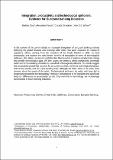Files in this item
Integration, productivity and technological spillovers : evidence for eurozone banking industries
Item metadata
| dc.contributor.author | Casu, Barbara | |
| dc.contributor.author | Ferrari, Alessandra | |
| dc.contributor.author | Girardone, Claudia | |
| dc.contributor.author | Wilson, John O. S. | |
| dc.date.accessioned | 2018-06-16T23:31:45Z | |
| dc.date.available | 2018-06-16T23:31:45Z | |
| dc.date.issued | 2016-12-16 | |
| dc.identifier | 243243166 | |
| dc.identifier | 13654b02-458e-48e6-b01a-88b18b6627e5 | |
| dc.identifier | 84997667009 | |
| dc.identifier | 000381530000025 | |
| dc.identifier.citation | Casu , B , Ferrari , A , Girardone , C & Wilson , J O S 2016 , ' Integration, productivity and technological spillovers : evidence for eurozone banking industries ' , European Journal of Operational Research , vol. 255 , no. 3 , pp. 971-983 . https://doi.org/10.1016/j.ejor.2016.06.007 | en |
| dc.identifier.issn | 0377-2217 | |
| dc.identifier.other | ORCID: /0000-0002-9554-9332/work/81797375 | |
| dc.identifier.uri | https://hdl.handle.net/10023/14140 | |
| dc.description.abstract | In the context of the current debate on increased integration of eurozone banking markets following the global financial and sovereign debt crises, this paper evaluates the impact of regulatory reform, starting from the inception of the Single Market in 1992, on bank productivity and assesses the cross-border benefits of integration in terms of technological spillovers. We utilise a parametric meta-frontier Divisia index to estimate productivity change and identify technological gaps. We then assess the extent to which productivity converges within and across banking industries as a result of technological spillovers. Our results suggest that productivity growth has occurred for eurozone countries, driven by technological progress, both at the country and the supra-country level, although the latter slows or in some cases reverses since the onset of the crisis. Technological spillovers do exist, and have led to progression toward the best technology. However, convergence is not complete and significant long run differences in productivity persist. Improvements in technology are increasingly concentrated in fewer banking industries. | |
| dc.format.extent | 13 | |
| dc.format.extent | 687990 | |
| dc.language.iso | eng | |
| dc.relation.ispartof | European Journal of Operational Research | en |
| dc.subject | Productivity Growth | en |
| dc.subject | Divisia Index | en |
| dc.subject | Spillovers | en |
| dc.subject | Convergence | en |
| dc.subject | European Banking | en |
| dc.subject | HB Economic Theory | en |
| dc.subject | BDC | en |
| dc.subject | R2C | en |
| dc.subject.lcc | HB | en |
| dc.title | Integration, productivity and technological spillovers : evidence for eurozone banking industries | en |
| dc.type | Journal article | en |
| dc.contributor.institution | University of St Andrews. School of Management | en |
| dc.contributor.institution | University of St Andrews. Centre for Responsible Banking and Finance | en |
| dc.identifier.doi | https://doi.org/10.1016/j.ejor.2016.06.007 | |
| dc.description.status | Peer reviewed | en |
| dc.date.embargoedUntil | 2018-06-16 |
This item appears in the following Collection(s)
Items in the St Andrews Research Repository are protected by copyright, with all rights reserved, unless otherwise indicated.

